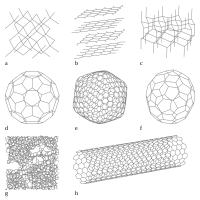
Photo from wikipedia
The relationship and mechanism between agricultural low-carbon technology application and farm household returns are not yet clear, especially the lack of evidence from developing countries. This paper takes large-scale farming… Click to show full abstract
The relationship and mechanism between agricultural low-carbon technology application and farm household returns are not yet clear, especially the lack of evidence from developing countries. This paper takes large-scale farming households in Jiangxi Province, China, from 2019 to 2020 as the research object, and obtains relevant data from field research to explore the intrinsic impact of agricultural low-carbon technology application on the returns of large-scale farming households. Based on the relevant theoretical analysis, the division dimensions of agricultural low-carbon technologies were proposed, and agricultural low-carbon technologies were subdivided into ten specific low-carbon technologies according to six dimensions: tillage system, breeding, fertilization, irrigation, medicine application, and waste treatment. Relevant questions were designed and researched to obtain data on the application status of low-carbon technologies in agriculture and the income cost status of large-scale farmers. Based on the theoretical analysis, the research hypotheses were proposed, and an empirical analysis was conducted based on the obtained data from large-scale farmers. The application of seven low-carbon technologies in agriculture: conservation tillage system, direct sowing technology, selection of compound fertilizer/organic fertilizer/controlled-release fertilizer, soil formula fertilization technology, deep fertilization/irrigation fertilization, sprinkler/drip irrigation/wet irrigation/intermittent irrigation, and straw resourceization significantly improved the income level of large-scale farmers. Furthermore, the application of biodegradable agricultural membranes, biopesticides, and new pesticide-controlled release technologies did not have significant effects on the income level of large-scale farmers, due to their low application and penetration rate. Based on the findings of the paper, the government should strengthen the promotion and subsidies of agricultural low-carbon technologies, especially those technologies that have no significant impact on large-scale farmers’ income, such as biodegradable agricultural membranes, biopesticides, and new pesticide controlled-release technologies, so as to achieve a win-win situation of reducing carbon emissions and increasing farmers’ income.
Journal Title: International Journal of Environmental Research and Public Health
Year Published: 2022
Link to full text (if available)
Share on Social Media: Sign Up to like & get
recommendations!